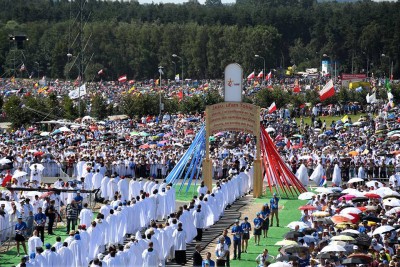
Aug 3, 2016 | Focolare Worldwide
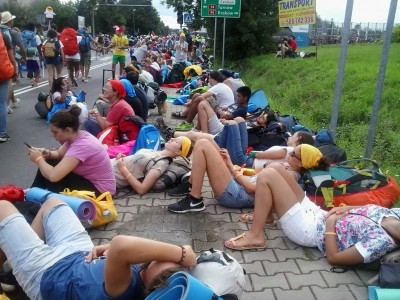 Anthony from the USA recounts: “Back in Chicago I’m used seeing everybody look out for themselves, without concern for others. As we made our way to the Field of Mercy someone came out of their house and offered us a tray of ice-cream . . . Another person gave water . . . I couldn’t believe my eyes!” Antonel is a Hungarian from Romania: “Although I live in Romania, I don’t speak much Romanian and have little contact with Romanians. The fact is, we feel that we’re Hungarians, not Romanians. We were in a group with both Romanians and Hungarians and it was just incredible. I learned more Romanian in those few days than I had in my entire life. I felt that we were real brothers and sisters. So many preujudices disappeared!” Anna from Italy: “Our luggage was quite heavy and a family invited us to go into their house. They offered to hold on to our luggage until the next day when we would be returning from the Field of Mercy. It seemed unreal. Then, when we returned they invited us in and offered us drinks and a bit of rest. We stayed with them for a while and then continued on. . .”
Anthony from the USA recounts: “Back in Chicago I’m used seeing everybody look out for themselves, without concern for others. As we made our way to the Field of Mercy someone came out of their house and offered us a tray of ice-cream . . . Another person gave water . . . I couldn’t believe my eyes!” Antonel is a Hungarian from Romania: “Although I live in Romania, I don’t speak much Romanian and have little contact with Romanians. The fact is, we feel that we’re Hungarians, not Romanians. We were in a group with both Romanians and Hungarians and it was just incredible. I learned more Romanian in those few days than I had in my entire life. I felt that we were real brothers and sisters. So many preujudices disappeared!” Anna from Italy: “Our luggage was quite heavy and a family invited us to go into their house. They offered to hold on to our luggage until the next day when we would be returning from the Field of Mercy. It seemed unreal. Then, when we returned they invited us in and offered us drinks and a bit of rest. We stayed with them for a while and then continued on. . .”  They were like an overflowing river . . . They had just arrived from Krakow after 10 hours of travelling. They were worn out but happy, filled with enthusiasm and determination. The Pope’s words entered deeply into their hearts. “We could say say WYD begins now and continues tomorrow at home, because that’s where Jesus wants to meet you from now on,” said Pope Francis at the Mass on the Field of Mercy. “The Lord doesn’t only wish only to remain in this city of fond memories, but to go to your homes and share in your everyday life: at school and your first years in the workplace, your friendships and your feelings, your plans and your dreams.” There were 600 young people from the Movement. Following the unforgettable experience at WYD they spent 5 days in Jasna on the Tatra Mountains in Slovakia.They wanted to make the Pope’s words become part of their lives and to discern together how to put them into practice in their lives. The Focolare young people were from 33 countries, from Australia to Brazil and Argentina, from Portugal to Russia. They say that they will never forget the experience of hospitality and brotherhood they experienced. The days ahead would be quite busy. The title chosen for their gathering was quite meaningful: “You God (got) me!” You’ve also swept us away, God. The gathering took place in the midst of the spectacular beauty of the Tarta Mountains and focused on three essential topics in the life of every human being: the relationship with God, the relationship with oneself and the relationship with others. The Pope’s words were the backdrop, along with the desire that no one take away their freedom to make courageous decisions to be “builders of the future”. The first day was spent telling stories about hospitality, helping one another, smiles, sharing – the Pope! They discussed his invitation to feel that Jesus calls them to leave their mark . . . a mark that marks history, that marks their story and the story of many others.” To not be “couch potatoes” but young people with their shoes laced, or better, with their hiking-boots laced. Domenico from the Cameroon summarized the sentiments of many: “A united world is possible, and we could reach universal brotherhood.” “As the Pope said, we should build bridges and reach out our hands to one another. I felt like judging so many countries that are creating wars in Africa, but as the Pope spoke I felt I had to change my way of thinking and begin to build those bridges. We reach brotherhood by building bridges; by hating we only destroy. Jesus allowed me to double my faith. Many times during my life I’ve wondered why there is so much suffering in the world, but now I realize that Jesus is there, that he becomes ugly in order to make everything beautiful. I’d like to be that way for others, to be active at building bridges. If we get our hands dirty, we’ll surely come to the point of living Jesus’s prayer to the Father: ‘that all be one’. Eva from Sovakia: “It struck us when the Pope blessed our dreams and our feet, giving significance to every effort we made.” “We have a lot of hard work ahead of us, but WYD shows that a new world is possible. It’s up to us to build it in the small steps that we take every day!” Pope Francis’s homily at WYD Mass, Mercy Field, July 31, 2016 Pope’s Address at WYD Prayer Vigil, July 30, 2016 Pope’s Words at WYD Way of the Cross
They were like an overflowing river . . . They had just arrived from Krakow after 10 hours of travelling. They were worn out but happy, filled with enthusiasm and determination. The Pope’s words entered deeply into their hearts. “We could say say WYD begins now and continues tomorrow at home, because that’s where Jesus wants to meet you from now on,” said Pope Francis at the Mass on the Field of Mercy. “The Lord doesn’t only wish only to remain in this city of fond memories, but to go to your homes and share in your everyday life: at school and your first years in the workplace, your friendships and your feelings, your plans and your dreams.” There were 600 young people from the Movement. Following the unforgettable experience at WYD they spent 5 days in Jasna on the Tatra Mountains in Slovakia.They wanted to make the Pope’s words become part of their lives and to discern together how to put them into practice in their lives. The Focolare young people were from 33 countries, from Australia to Brazil and Argentina, from Portugal to Russia. They say that they will never forget the experience of hospitality and brotherhood they experienced. The days ahead would be quite busy. The title chosen for their gathering was quite meaningful: “You God (got) me!” You’ve also swept us away, God. The gathering took place in the midst of the spectacular beauty of the Tarta Mountains and focused on three essential topics in the life of every human being: the relationship with God, the relationship with oneself and the relationship with others. The Pope’s words were the backdrop, along with the desire that no one take away their freedom to make courageous decisions to be “builders of the future”. The first day was spent telling stories about hospitality, helping one another, smiles, sharing – the Pope! They discussed his invitation to feel that Jesus calls them to leave their mark . . . a mark that marks history, that marks their story and the story of many others.” To not be “couch potatoes” but young people with their shoes laced, or better, with their hiking-boots laced. Domenico from the Cameroon summarized the sentiments of many: “A united world is possible, and we could reach universal brotherhood.” “As the Pope said, we should build bridges and reach out our hands to one another. I felt like judging so many countries that are creating wars in Africa, but as the Pope spoke I felt I had to change my way of thinking and begin to build those bridges. We reach brotherhood by building bridges; by hating we only destroy. Jesus allowed me to double my faith. Many times during my life I’ve wondered why there is so much suffering in the world, but now I realize that Jesus is there, that he becomes ugly in order to make everything beautiful. I’d like to be that way for others, to be active at building bridges. If we get our hands dirty, we’ll surely come to the point of living Jesus’s prayer to the Father: ‘that all be one’. Eva from Sovakia: “It struck us when the Pope blessed our dreams and our feet, giving significance to every effort we made.” “We have a lot of hard work ahead of us, but WYD shows that a new world is possible. It’s up to us to build it in the small steps that we take every day!” Pope Francis’s homily at WYD Mass, Mercy Field, July 31, 2016 Pope’s Address at WYD Prayer Vigil, July 30, 2016 Pope’s Words at WYD Way of the Cross
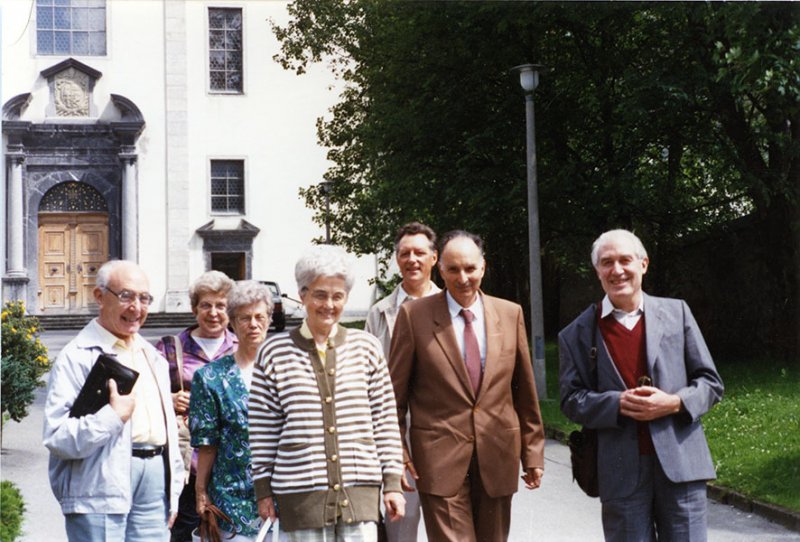
Aug 2, 2016 | Focolare Worldwide
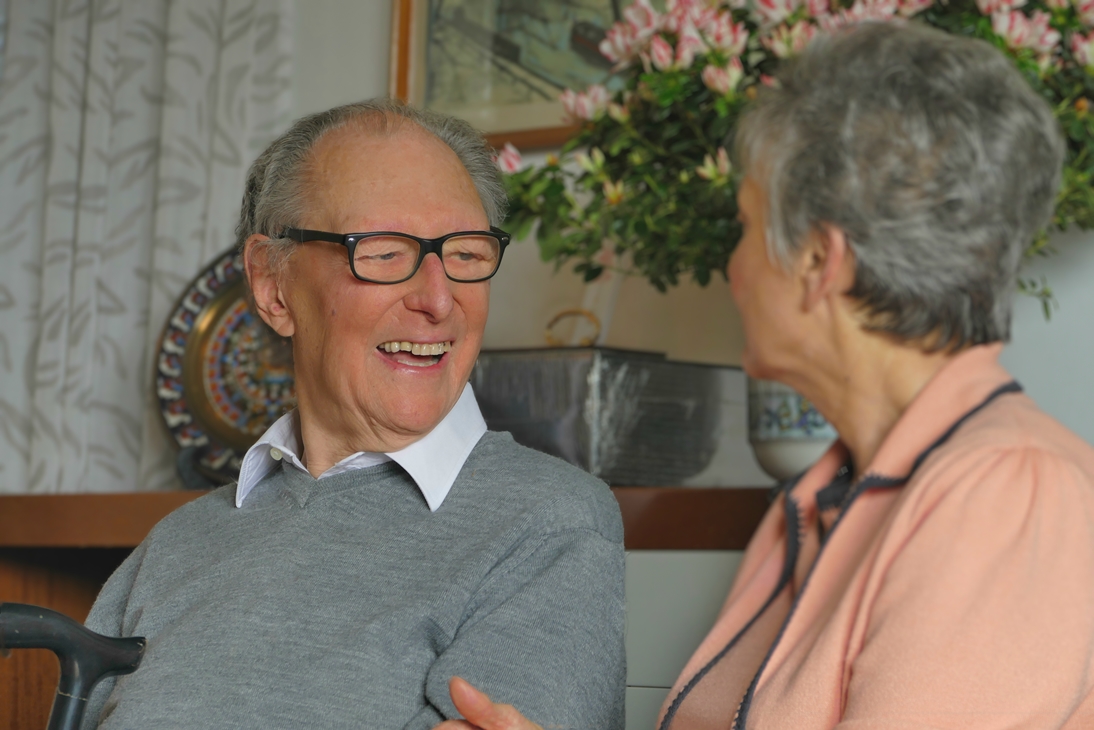 “He was for many a true testimony of God’s infinite mercy,” Maria Voce wrote to the members of the Movement, “which he now is certainly experiencing in fullness.” Born in Pistoia, on 8 September 1926, Bruno Venturini met the newly born Movement in December 1949, when, Graziella De Luca, one the first women focolarine, went to his city to meet Pasquale Foresi. He was ordained priest in 1978, and covered many roles in the Movement, but he would have later said that “one of the biggest graces I received was that of sharing the responsibility for the aspect of Economy and Work for over 30 years, with Giosi Guella, an exceptional person, and experience in person the constant Providence that made us feel totally in God’s hands.”
“He was for many a true testimony of God’s infinite mercy,” Maria Voce wrote to the members of the Movement, “which he now is certainly experiencing in fullness.” Born in Pistoia, on 8 September 1926, Bruno Venturini met the newly born Movement in December 1949, when, Graziella De Luca, one the first women focolarine, went to his city to meet Pasquale Foresi. He was ordained priest in 1978, and covered many roles in the Movement, but he would have later said that “one of the biggest graces I received was that of sharing the responsibility for the aspect of Economy and Work for over 30 years, with Giosi Guella, an exceptional person, and experience in person the constant Providence that made us feel totally in God’s hands.”

Bruno Venturini (third from right) was always close to Chiara Lubich.
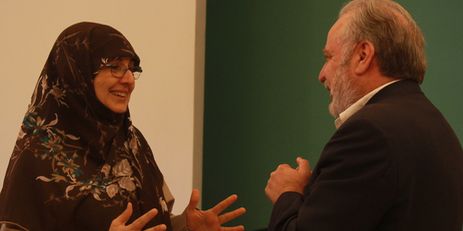
Aug 1, 2016 | Focolare Worldwide
 “The results are far beyond our greatest expectations,” said Roberto Catalano from the Focolare’s Centre for Interreligious Dialogue at the conclusion of a gathering of the “Wings of Unity” research group that has come up with rather a challenging agenda, considering the difficult phase that Europe is going through. The Co-Directors of the project are SUI President Piero Coda and Professor Mohammad Ali Shomali, Director of the Islamic Centre of England. The idea of meeting at Loppiano, Italy, goes back to last April when Professor Shomali had been invited to present a lecture at the Interdisciplinary Perspectives on Religions in the Contemporary World course that was offered by SUI in collaboration with Professor Frizzi. But the origins of Wings of Unity go back even in a story of friendship, solidarity and trust between Muslim and Christian friends of the Focolare. That friendship began 19 years ago in daily life settings and in the halls of academia, and has now evolved into a common interreligious witness of universal brother and sisterhood. That is what it was for the 14 members – 5 of them Shiites – of the seminar that was recently held at SUI on July 8-10, 2016. Iranian theologian Sharzad Housmand, professor at the Gregorian Pontifical University and expert in Islamic-Christian Dialogue, was also in attendance and highlighted the great novelty of the event. The same was true for Christian Arooj Javed, SUI student from Pakistan who said she could never even have imagined such a spirit of communion and, at the same time, openness and transparency between Christians and Muslims. The work began with texts from Chiara Lubich, presented by Coda and Catalano, in which the Focolare foundress highlighted the fact that unity is something that should be sought with everyone, because we are all children of a single Father. Professor Shomali then presented some excerpts from the Koran and successive traditions that were in harmony with what Chiara Lubich had written. To everyone’s surprise, the more the dialogue deepened, the more the “hardness” of diversity faded giving space to a dialogue that was marked by deep listening and mutual understanding. The presentations given by Professor Callebaut and Professor Ropelato that focused on the centrality of love were also valuable. They indicated the capacity of human beings to unite diverse human settings both within and outside themselves as the new line for social, economic and political life. The contributions from the Shitte guests opened new and timely scenarios for the experience of unity as a value that becomes kairos, [at] the right moment. Professor Mahnaz Heydarpoor’s words sounded convincing as she called for training in interreligious dialogue for the new generations. An interreligious summer school workshop for young people has been scheduled for 2017 which will continue the communion that was begun at this school: “After years spent in building trust among us,” one Muslim remarked, “the new generations no longer need to wait: We want to do everything we can so that they will be able to experience the unity that so intensely filled our hearts and minds in these days.” Source: Sophia online
“The results are far beyond our greatest expectations,” said Roberto Catalano from the Focolare’s Centre for Interreligious Dialogue at the conclusion of a gathering of the “Wings of Unity” research group that has come up with rather a challenging agenda, considering the difficult phase that Europe is going through. The Co-Directors of the project are SUI President Piero Coda and Professor Mohammad Ali Shomali, Director of the Islamic Centre of England. The idea of meeting at Loppiano, Italy, goes back to last April when Professor Shomali had been invited to present a lecture at the Interdisciplinary Perspectives on Religions in the Contemporary World course that was offered by SUI in collaboration with Professor Frizzi. But the origins of Wings of Unity go back even in a story of friendship, solidarity and trust between Muslim and Christian friends of the Focolare. That friendship began 19 years ago in daily life settings and in the halls of academia, and has now evolved into a common interreligious witness of universal brother and sisterhood. That is what it was for the 14 members – 5 of them Shiites – of the seminar that was recently held at SUI on July 8-10, 2016. Iranian theologian Sharzad Housmand, professor at the Gregorian Pontifical University and expert in Islamic-Christian Dialogue, was also in attendance and highlighted the great novelty of the event. The same was true for Christian Arooj Javed, SUI student from Pakistan who said she could never even have imagined such a spirit of communion and, at the same time, openness and transparency between Christians and Muslims. The work began with texts from Chiara Lubich, presented by Coda and Catalano, in which the Focolare foundress highlighted the fact that unity is something that should be sought with everyone, because we are all children of a single Father. Professor Shomali then presented some excerpts from the Koran and successive traditions that were in harmony with what Chiara Lubich had written. To everyone’s surprise, the more the dialogue deepened, the more the “hardness” of diversity faded giving space to a dialogue that was marked by deep listening and mutual understanding. The presentations given by Professor Callebaut and Professor Ropelato that focused on the centrality of love were also valuable. They indicated the capacity of human beings to unite diverse human settings both within and outside themselves as the new line for social, economic and political life. The contributions from the Shitte guests opened new and timely scenarios for the experience of unity as a value that becomes kairos, [at] the right moment. Professor Mahnaz Heydarpoor’s words sounded convincing as she called for training in interreligious dialogue for the new generations. An interreligious summer school workshop for young people has been scheduled for 2017 which will continue the communion that was begun at this school: “After years spent in building trust among us,” one Muslim remarked, “the new generations no longer need to wait: We want to do everything we can so that they will be able to experience the unity that so intensely filled our hearts and minds in these days.” Source: Sophia online
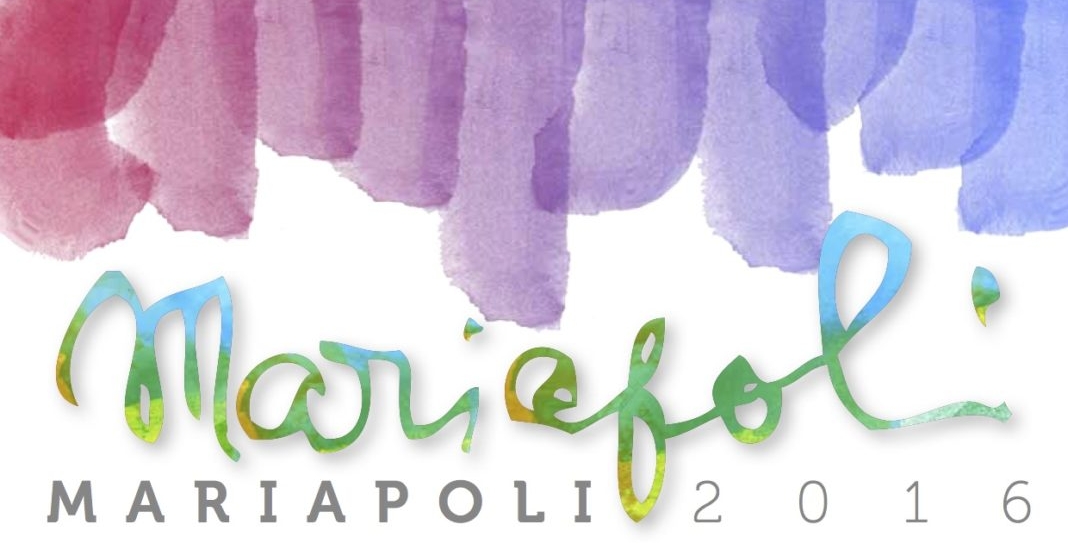
Jul 30, 2016 | Senza categoria
 What is the Mariapolis? The word literally means City of Mary and refers to a gathering of several days for Focolare members and friends, young and old, people of all backgrounds who strive to live in a spirit of brotherhood in light of the universal values of the Gospel. This rather unique experience that is repeated in many countries around the world is shaped by the Golden Rule which invites us to do unto others as we would have them do unto us. At a Mariapolis it is possible to see what it would be like in daily life if our relationships were based on being gifts for one another. History of the Mariapolis In the difficult post-war period while struggling to heal from the wounds inflicted on all the nations of Europe by the Second World War, a growing number of young people, families, workers, professionals and politicans joined members of the nascent Movement for summer holidays in the mountains of Trentino, Italy. Right from the start the Mariapolis was a small chunk of society renewed by the love of the Gospel. South Tyroleans and Italians, French and Germans all participated as the hatred of the war quickly melted away. An old Mariapolis song describes the spirit of fraternity at those first cities of Mary: “Train operators, students, doctors, chemists and parliamentarians go to the Mariapolis and discover that they are brothers and sisters. What matter then our posts or positions, when we’ve been made brothers and sisters here?” That unique atmosphere of brotherhood which was the hallmark of the first city of Mary is still experienced in Mariapolises throughout the world. From early on, a note of internationality characterized the Movement which was spreading rapidly, first in Italy and then, in 1952, in the other countries of Europe and to the other continents in 1958. In 1959, more than 10,000 people attended the Mariapolis at Fiera di Primiero in Trentino, Italy. Twenty seven countries from different continents were represented. At that Mariapolis – and later in 1960 at Freiburg, Germany – while speaking to an international gathering about unity among the peoples of the world, Chiara Lubich proposed the Gospel commandment of love as the relationship that could exist between nations: “Love your neighbour’s country as your own.” The Mariapolis continues today on all 5 continents and now there are also twenty permanent Mariapolises around the world, the first and most developed in Loppiano, Italy.
What is the Mariapolis? The word literally means City of Mary and refers to a gathering of several days for Focolare members and friends, young and old, people of all backgrounds who strive to live in a spirit of brotherhood in light of the universal values of the Gospel. This rather unique experience that is repeated in many countries around the world is shaped by the Golden Rule which invites us to do unto others as we would have them do unto us. At a Mariapolis it is possible to see what it would be like in daily life if our relationships were based on being gifts for one another. History of the Mariapolis In the difficult post-war period while struggling to heal from the wounds inflicted on all the nations of Europe by the Second World War, a growing number of young people, families, workers, professionals and politicans joined members of the nascent Movement for summer holidays in the mountains of Trentino, Italy. Right from the start the Mariapolis was a small chunk of society renewed by the love of the Gospel. South Tyroleans and Italians, French and Germans all participated as the hatred of the war quickly melted away. An old Mariapolis song describes the spirit of fraternity at those first cities of Mary: “Train operators, students, doctors, chemists and parliamentarians go to the Mariapolis and discover that they are brothers and sisters. What matter then our posts or positions, when we’ve been made brothers and sisters here?” That unique atmosphere of brotherhood which was the hallmark of the first city of Mary is still experienced in Mariapolises throughout the world. From early on, a note of internationality characterized the Movement which was spreading rapidly, first in Italy and then, in 1952, in the other countries of Europe and to the other continents in 1958. In 1959, more than 10,000 people attended the Mariapolis at Fiera di Primiero in Trentino, Italy. Twenty seven countries from different continents were represented. At that Mariapolis – and later in 1960 at Freiburg, Germany – while speaking to an international gathering about unity among the peoples of the world, Chiara Lubich proposed the Gospel commandment of love as the relationship that could exist between nations: “Love your neighbour’s country as your own.” The Mariapolis continues today on all 5 continents and now there are also twenty permanent Mariapolises around the world, the first and most developed in Loppiano, Italy.
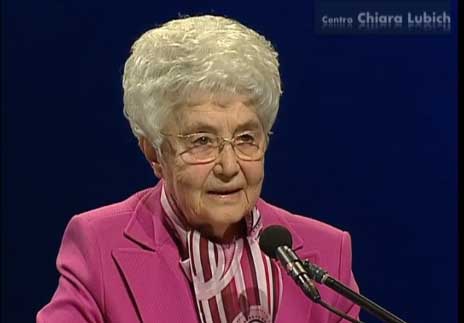
Jul 30, 2016 | Focolare Worldwide, Senza categoria
 “Why are you going to the WYD?” “Because I hope to meet Jesus,” answered a girl who came all the way to Cologne, together with hundreds of thousands of young people from all over the world. I think that she is not the only one who feels this urgent desire to meet Jesus! And it is also the motto of this WYD: look for Christ, find him and adore him. The “World Youth Day” – this inspirational invention of our beloved Pope John Paul II – is a privileged occasion to meet the living Christ in his Church (…). To meet Jesus, adore him and then bring him wherever we go. Dear youth, do you know that there is a secret so you will not lose this Jesus whom you have met during the WYD events, and who appeared to us as such a beautiful, dynamic and fascinating person? The secret is this: we have to love! To love God and remain in Him, and be always in the light, we have to love the others! You see, this is the experience I have acquired in more than 60 years, but it is also the experience of a whole population spread out over the globe, millions of men, women and children who have chosen love as their lifestyle! This is the secret for a happy, full, interesting and ever new life, one that is never boring but always full of surprises! Let me give you a small but great example: I found out recently that a group of young people in a refugee camp in Africa, where practically everything is lacking, wants to change their camp into a paradise through love and they have told me of really concrete experiences that are producing these results. So you see? It means that love overcomes all! We could say numberless things about this love which Jesus taught us with his life, world, and saints. But just for today I would like to underline only two fundamental points: We should love EVERYONE, without exceptions or favouritism– the way God loves us! –and this consists in loving our enemy, that nice and unpleasant person, your teacher, next door neighbour, the postman, and your colleague. To love ALL means also to love people who are far away, but who are present through the mass media, like the victims of the Tsunami in Southeast Asia, or those whom you helped with the Solidarity Fund. The second point is: we have to be THE FIRST to love. We usually love when we are loved, to respond to the love we receive. And if we don’t receive it? No, it is even better to take the initiative, be the first to start, giving a sign of friendship, forgiveness, and the will to start from the very beginning. Try to love in this manner, and you will experience immense freedom because you are the protagonists! Dear youth, take courage! A life like this is worth the while, and you are not made to do things halfway. So give your heart to Him who knows how to fill it. God needs youth like this, inflamed, who cannot be hindered by their own problems, people who have burnt all in the fire of God’s love and who have influenced all to do the same. May Jesus whom you have met, be always with you! In true Love. (Chiara Lubich, Cologne, 16 August 2005) Source: Chiara Lubich Centre
“Why are you going to the WYD?” “Because I hope to meet Jesus,” answered a girl who came all the way to Cologne, together with hundreds of thousands of young people from all over the world. I think that she is not the only one who feels this urgent desire to meet Jesus! And it is also the motto of this WYD: look for Christ, find him and adore him. The “World Youth Day” – this inspirational invention of our beloved Pope John Paul II – is a privileged occasion to meet the living Christ in his Church (…). To meet Jesus, adore him and then bring him wherever we go. Dear youth, do you know that there is a secret so you will not lose this Jesus whom you have met during the WYD events, and who appeared to us as such a beautiful, dynamic and fascinating person? The secret is this: we have to love! To love God and remain in Him, and be always in the light, we have to love the others! You see, this is the experience I have acquired in more than 60 years, but it is also the experience of a whole population spread out over the globe, millions of men, women and children who have chosen love as their lifestyle! This is the secret for a happy, full, interesting and ever new life, one that is never boring but always full of surprises! Let me give you a small but great example: I found out recently that a group of young people in a refugee camp in Africa, where practically everything is lacking, wants to change their camp into a paradise through love and they have told me of really concrete experiences that are producing these results. So you see? It means that love overcomes all! We could say numberless things about this love which Jesus taught us with his life, world, and saints. But just for today I would like to underline only two fundamental points: We should love EVERYONE, without exceptions or favouritism– the way God loves us! –and this consists in loving our enemy, that nice and unpleasant person, your teacher, next door neighbour, the postman, and your colleague. To love ALL means also to love people who are far away, but who are present through the mass media, like the victims of the Tsunami in Southeast Asia, or those whom you helped with the Solidarity Fund. The second point is: we have to be THE FIRST to love. We usually love when we are loved, to respond to the love we receive. And if we don’t receive it? No, it is even better to take the initiative, be the first to start, giving a sign of friendship, forgiveness, and the will to start from the very beginning. Try to love in this manner, and you will experience immense freedom because you are the protagonists! Dear youth, take courage! A life like this is worth the while, and you are not made to do things halfway. So give your heart to Him who knows how to fill it. God needs youth like this, inflamed, who cannot be hindered by their own problems, people who have burnt all in the fire of God’s love and who have influenced all to do the same. May Jesus whom you have met, be always with you! In true Love. (Chiara Lubich, Cologne, 16 August 2005) Source: Chiara Lubich Centre

Jul 28, 2016 | Focolare Worldwide
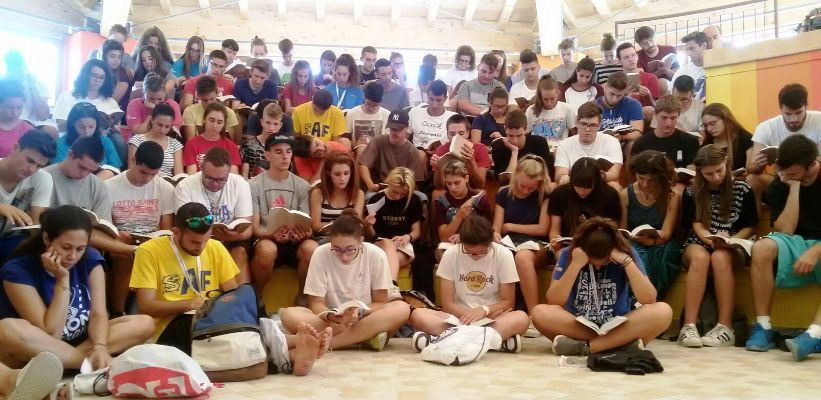 The five coaches of 17-year-olds left Verona for Poland, accompanied by priests, animators and families. The camp in Krakow that was awaiting them was part of the World Youth Day and had been organised exclusively for them. There were also some Gen3 in the group, enthusiastic to be able to also participate in this experience. «The trip also included a stopover in Munich – recounted Fr. Stefano Marcolini of the Focolare, one of the priests accompanying the group – to visit the former Nazi concentration camp in Dachau. Upon returning to Munich in the evening, we decided to go sightseeing in the city, unaware that it would become the site of a terroristic attack. Thank God we were not in the vicinity of the mall where the shooting occurred, but there was such a great confusion that the entire city (the underground, bars and public places) were in a panic situation.It was really fearful and we also had a hard time gathering the group. Thankfully, we had our cell phones and Google maps. Finally at 3 am, we were able to find everyone, and were so generously helped by the local Church which offered us a substantial breakfast. We were contacted by the Local Ministry of Foreign Affairs and received the order to return to Italy, since the group was composed of minors.»
The five coaches of 17-year-olds left Verona for Poland, accompanied by priests, animators and families. The camp in Krakow that was awaiting them was part of the World Youth Day and had been organised exclusively for them. There were also some Gen3 in the group, enthusiastic to be able to also participate in this experience. «The trip also included a stopover in Munich – recounted Fr. Stefano Marcolini of the Focolare, one of the priests accompanying the group – to visit the former Nazi concentration camp in Dachau. Upon returning to Munich in the evening, we decided to go sightseeing in the city, unaware that it would become the site of a terroristic attack. Thank God we were not in the vicinity of the mall where the shooting occurred, but there was such a great confusion that the entire city (the underground, bars and public places) were in a panic situation.It was really fearful and we also had a hard time gathering the group. Thankfully, we had our cell phones and Google maps. Finally at 3 am, we were able to find everyone, and were so generously helped by the local Church which offered us a substantial breakfast. We were contacted by the Local Ministry of Foreign Affairs and received the order to return to Italy, since the group was composed of minors.»  But the kids refused to be overcome, and were encouraged by the words of Pope Francis who had invited the youth to the WYD: “Don’t let anyone steal hope from you.” Upon returning to Italy, they wished to take part just the same in a camp –to do what they would have wanted to do in Krakow – and which the Bishop rapidly set up in a nice place in the mountains. «Upon hearing about their adventure, the Pope encouraged the boys and girls not to give up and told them that all were awaiting them in Krakow. In the meantime, three of them, accompanied by a priest, were invited to Krakow for the Festival of the Italian youth.They were also chosen by the other youths to participate in the linkup with Pope Francis and address him in the Q&A session, precisely regarding the facts in Munich.» «To respond to the Pope’s personal invitation – continued Fr. Stefano – at the end of the camp the coaches headed for Poland, where we arrived on Saturday, the 30th just in time for a private audience with him, since he had changed his previous programme. In addition, due to the great meeting on Saturday evening, where around two million boys and girls were awaited, the Verona group received passes to sit in the first row.All this happened because, as Riccardo, one of the Gen3 said, “We did not allow anyone to steal our hopes from us!”»
But the kids refused to be overcome, and were encouraged by the words of Pope Francis who had invited the youth to the WYD: “Don’t let anyone steal hope from you.” Upon returning to Italy, they wished to take part just the same in a camp –to do what they would have wanted to do in Krakow – and which the Bishop rapidly set up in a nice place in the mountains. «Upon hearing about their adventure, the Pope encouraged the boys and girls not to give up and told them that all were awaiting them in Krakow. In the meantime, three of them, accompanied by a priest, were invited to Krakow for the Festival of the Italian youth.They were also chosen by the other youths to participate in the linkup with Pope Francis and address him in the Q&A session, precisely regarding the facts in Munich.» «To respond to the Pope’s personal invitation – continued Fr. Stefano – at the end of the camp the coaches headed for Poland, where we arrived on Saturday, the 30th just in time for a private audience with him, since he had changed his previous programme. In addition, due to the great meeting on Saturday evening, where around two million boys and girls were awaited, the Verona group received passes to sit in the first row.All this happened because, as Riccardo, one of the Gen3 said, “We did not allow anyone to steal our hopes from us!”»
Jul 28, 2016 | Non categorizzato, Word of
The words of the Gospel shape our lives and give us God’s own life, if we live them. If we share what we experience with others, it does not only nourish them, it gives us life too. By now we have been living the Word of Life for seventy years. The text comes to us and we read the commentary. But what we hope will remain is the sentence that is offered, a word of Scripture, often from Jesus. The ‘Word of Life’ is not simply a meditation, but Jesus speaks in it. He invites us to live, always bringing us to love, to make a gift of our lives. It was an ‘invention’ of Chiara Lubich, who speaks of its origins like this: ‘I was hungry for truth, and I studied philosophy. Indeed, more than that: like many other young people I sought truth and I believed I would find it in study. But then came one of those great ideas from the early times of the Movement, which I immediately communicated to my companions, “What point is there in looking for truth when it lives incarnate in Jesus, the God-man? If the truth attracts us, let’s leave everything, let’s look for Him, and let’s follow Him.” And that is what we did.’ They took the Gospel into their hands and began reading it word by word. They found it completely new. ‘Each word of Jesus was a burst of brightly shining light, all divine! … His words were unique, eternal … fascinating, fashioned with a divine form … they were words of life, to be translated into life, universal words in the midst of space and time.’ They discovered them not to be stuck in the past, not a mere memory, but words that He continuously speaks to us, as He does to each person in every time and place.[1] Yet is Jesus truly our Teacher? We are surrounded by many proposals for our lives, by many teachers of thought, some of them twisted that even lead to violence, while others are straight and enlightening. And yet the words of Jesus have a depth and an ability to attract and move us that other words, whether they be of philosophers, politicians, or poets, do not have. They are ‘words of life’; they can be lived, and they give us the fullness of life; they communicate God’s own life. Each month we focus on one, so that, bit by bit the Gospel penetrates our spirit, transforms us, makes us acquire Jesus’s very own thought, so that we are able to respond to the most widely different situations. Jesus shows himself to be our Teacher. At times we can read the Gospel together. We would like Jesus himself, the Risen Lord, living in the midst of those who are gathered in his name, to explain it, to make it current for us, to suggest how we can put it into practice. The really new thing about the ‘Word of Life’, however, is that we can share our experiences, the graces given when we live it, just as Chiara explained when speaking of what happened in the early times which are still with us now: ‘We felt we had a duty to communicate to others what we had experienced, also because we were aware that by giving it an experience remained and built up our inner life, while, if we did not give it, bit by bit our soul was impoverished. The word was therefore lived intensely all day long and the results were communicated not only among us, but with those who joined the first group…. When it was lived, it was no longer I or we who lived, but the word lived in me, the word lived in the group. And this was the Christian revolution with all of its consequences.’[2] It can be like this today for us too. Fabio Ciardi ______________________ [1] Scritti spirituali, vol. 3 (Rome: Città Nuova, 1979), p. 124. [2] Ibid. pp. 128, 130.
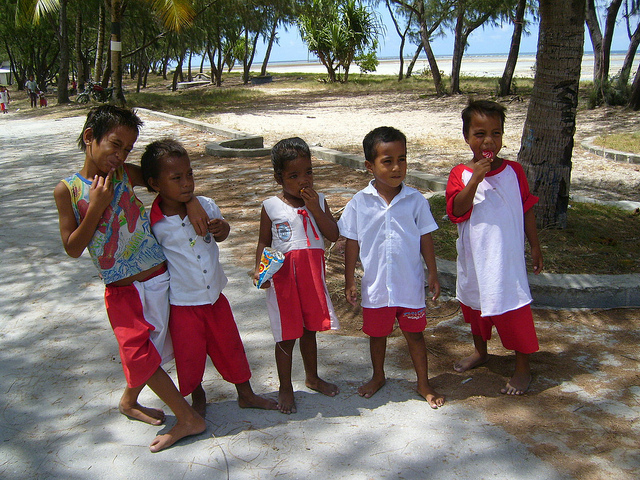
Jul 27, 2016 | Focolare Worldwide
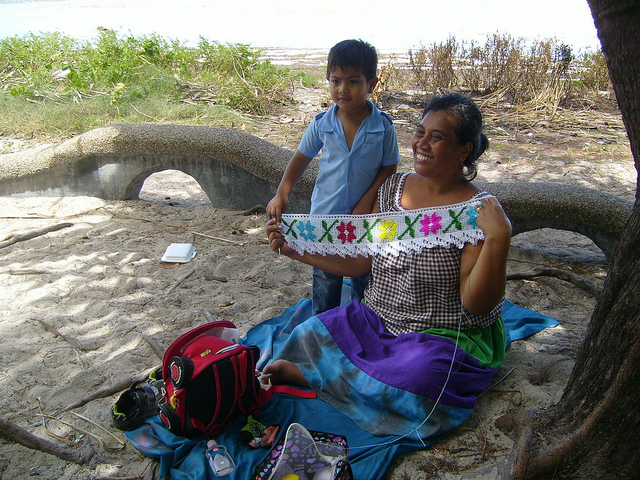 The project that is run by the AMU (Action for a United World) has been operating for several years among the Buota population in one of the poorest villages on the island of Tarawa. Its goal is to improve living conditions in the community with projects that are focused mainly on women and children. Sixty one children of both Catholic and other religious faiths attend the nursery school. Fifteen children fulfilled the pre-school requirements and obtained the certificate of competence from the Ministry of Public Education that qualifies them to begin primary school. “The nursery school also strengthened collaboration among members of the community,” Buota reports. “Children’s mothers often work as a group to provide support. Along with several fundraisers selling bread and blocks of ice, they also contributed to the construction of a new classroom, collecting straw for the roof. The Focolare community, which had come up with the idea for the project, was also actively engaged in the construction of the new classroom that provided more space for the growing pre-school population.” The Kiribati project also provides training classes for women. “At times these were difficult to arrange due to the poor condition of the roads. It’s usually difficult to reach the village; nevertheless, this difficulty was also overcome.”
The project that is run by the AMU (Action for a United World) has been operating for several years among the Buota population in one of the poorest villages on the island of Tarawa. Its goal is to improve living conditions in the community with projects that are focused mainly on women and children. Sixty one children of both Catholic and other religious faiths attend the nursery school. Fifteen children fulfilled the pre-school requirements and obtained the certificate of competence from the Ministry of Public Education that qualifies them to begin primary school. “The nursery school also strengthened collaboration among members of the community,” Buota reports. “Children’s mothers often work as a group to provide support. Along with several fundraisers selling bread and blocks of ice, they also contributed to the construction of a new classroom, collecting straw for the roof. The Focolare community, which had come up with the idea for the project, was also actively engaged in the construction of the new classroom that provided more space for the growing pre-school population.” The Kiribati project also provides training classes for women. “At times these were difficult to arrange due to the poor condition of the roads. It’s usually difficult to reach the village; nevertheless, this difficulty was also overcome.”  Last year four members of the Health Ministry conducted a workshop on childhood nutrition. They discussed the importance of a nourishing diet for physical and mental development, hygiene, natural family planning and organic gardening. A 2-day workshop on organic gardening for the promotion of healthy living was offered with the collaboration of experts from the Department of Agriculture. The importance of spreading this natural approach to gardening with neighbours was strongly stressed, so that many others could learn how to obtain a rich and organic planting soil more easily. By the end of 2015 the first tomatoes and cabbages were already appearing in many of Buota’s organic home gardens! And this is important given the local setting where there is a progressive rise in sea level and decrease in the amount of farmland for planting. Source: AMU online (Associazione per un mondo unito). http://www.amu-it.eu/2016/07/19/kiribati-i-bimbi-crescono-e-anche-i-cavoli/?lang=it
Last year four members of the Health Ministry conducted a workshop on childhood nutrition. They discussed the importance of a nourishing diet for physical and mental development, hygiene, natural family planning and organic gardening. A 2-day workshop on organic gardening for the promotion of healthy living was offered with the collaboration of experts from the Department of Agriculture. The importance of spreading this natural approach to gardening with neighbours was strongly stressed, so that many others could learn how to obtain a rich and organic planting soil more easily. By the end of 2015 the first tomatoes and cabbages were already appearing in many of Buota’s organic home gardens! And this is important given the local setting where there is a progressive rise in sea level and decrease in the amount of farmland for planting. Source: AMU online (Associazione per un mondo unito). http://www.amu-it.eu/2016/07/19/kiribati-i-bimbi-crescono-e-anche-i-cavoli/?lang=it
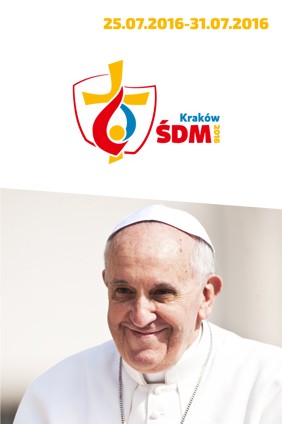
Jul 26, 2016 | Focolare Worldwide
Dear Brothers and Sisters, The 31st World Youth Day is fast approaching. I look forward to meeting the young people from throughout the world gathered in Kraków and having the opportunity to meet the beloved Polish nation. My entire visit will be inspired by Mercy during this Jubilee Year, and by the grateful and blessed memory of Saint John Paul II, who instituted the World Youth Days and was the guide of the Polish people in its recent historic journey towards freedom. Dear young people of Poland, I know that for some time now you have been preparing, especially with your prayers, for this great encounter in Kraków. I thank you heartily for everything that you have done, and for the love with which you have done it. Even now I embrace you and I bless you. Dear young people from throughout Europe, Africa, America, Asia and Oceania! I also bless your countries, your hopes and your journey to Kraków, praying that it will be a pilgrimage of faith and fraternity. May the Lord Jesus grant you the grace to experience personally his words: “Blessed are the merciful, for they will receive mercy” (Mt 5:7). I am very anxious to meet you and to offer the world a new sign of harmony, a mosaic of different faces, from many races, languages, peoples and cultures, but all united in the name of Jesus, who is the Face of Mercy. I now turn to you, dear sons and daughters of the Polish nation! For me, it is a great gift of the Lord to visit you. You are a nation that throughout its history has experienced so many trials, some particularly difficult, and has persevered through the power of faith, upheld by the maternal hands of the Virgin Mary. I am certain that my pilgrimage to the shrine of Czestochowa will immerse me in this proven faith and do me so much good. I thank you for your prayers in preparation for my visit. I thank the bishops and priests, the men and women religious, and the lay faithful, especially families, to whom I will symbolically bring the Post-Synodal Apostolic Exhortation Amoris Laetitia. The moral and spiritual “health” of a nation is seen in its families. That is why Saint John Paul II showed such great concern for engaged couples, young married couples and families. Continue along this road! Dear brothers and sisters, I send you this message as a pledge of my affection. Let us keep close to one another in prayer. I look forward to seeing you in Poland!
The 31st World Youth Day is fast approaching. I look forward to meeting the young people from throughout the world gathered in Kraków and having the opportunity to meet the beloved Polish nation. My entire visit will be inspired by Mercy during this Jubilee Year, and by the grateful and blessed memory of Saint John Paul II, who instituted the World Youth Days and was the guide of the Polish people in its recent historic journey towards freedom. Dear young people of Poland, I know that for some time now you have been preparing, especially with your prayers, for this great encounter in Kraków. I thank you heartily for everything that you have done, and for the love with which you have done it. Even now I embrace you and I bless you. Dear young people from throughout Europe, Africa, America, Asia and Oceania! I also bless your countries, your hopes and your journey to Kraków, praying that it will be a pilgrimage of faith and fraternity. May the Lord Jesus grant you the grace to experience personally his words: “Blessed are the merciful, for they will receive mercy” (Mt 5:7). I am very anxious to meet you and to offer the world a new sign of harmony, a mosaic of different faces, from many races, languages, peoples and cultures, but all united in the name of Jesus, who is the Face of Mercy. I now turn to you, dear sons and daughters of the Polish nation! For me, it is a great gift of the Lord to visit you. You are a nation that throughout its history has experienced so many trials, some particularly difficult, and has persevered through the power of faith, upheld by the maternal hands of the Virgin Mary. I am certain that my pilgrimage to the shrine of Czestochowa will immerse me in this proven faith and do me so much good. I thank you for your prayers in preparation for my visit. I thank the bishops and priests, the men and women religious, and the lay faithful, especially families, to whom I will symbolically bring the Post-Synodal Apostolic Exhortation Amoris Laetitia. The moral and spiritual “health” of a nation is seen in its families. That is why Saint John Paul II showed such great concern for engaged couples, young married couples and families. Continue along this road! Dear brothers and sisters, I send you this message as a pledge of my affection. Let us keep close to one another in prayer. I look forward to seeing you in Poland!
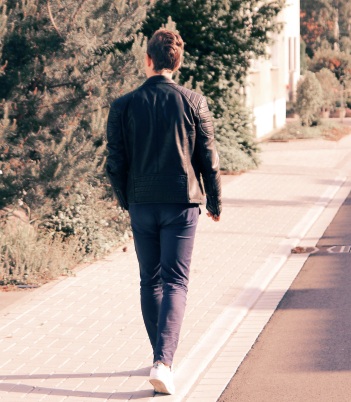
Jul 25, 2016 | Senza categoria
 Accepting others “The Town Hall of my city was instituting a special service for the immigrants. I felt the urge to offer my help for this new service. I tried to find out who had answered to this project in my condominium. Upon meeting various families I realized how much people disliked non-EU nationals. At work many colleagues were irked by the presence of immigrants who are regarded only as competitors for jobs and housing. At first I spoke to my colleagues, trying to stress the importance of accepting those who were different, and it appeared to be of no avail. But slowly I saw that both they and the inhabitants of my condominium, started to take on a “softer” attitude.” (E. M. – Italy) The start of a new faith “I recall that I had just arrived at work when a brutal air raid began. I went with my colleagues to take shelter underground, with an ear to the radio to catch some news. That was how I got to know that also the district where my husband works had been bombed. I felt sick and was about to faint. In that moment I started thinking: «God you are now asking me to renew my faith in you.» I entrusted my children, husband, and parents to him, asking him to help us not to stray from him. Above all I asked him that should the children find themselves orphans, they would encounter in their path people who would guide them towards him. It was an unforgettable heart-to-heart dialogue with God. From that moment on, I have continued my life with faith and infinite gratitude.” (H. S. – Lebanon) Cleaning “One day the owner of the building where I live decided to eliminate all the antennas on the roof, probably for the sake of aesthetics. However, a warring atmosphere brewed in the housing block. How would we have ever won against “Goliath?” The Gospel urged me to try the strategy of humility. Since the doorman was absent for health reasons, the cleaning of the stairs and the entrance was really scarce. Given that the other tenants would never have even dreamt of cleaning their own landings, I took the initiative and started cleaning the stairs right down to the sidewalk. I did it with joy and commitment. That same evening, the owner rang my doorbell and very courteously offered to fix my TV antenna. Surprised and wordless, I took advantage of his good intentions to ask him to install also the other antennas. In the end, all the antennas returned in place. From that moment on, my relationship with my neighbours changed. In addition, they take turns in cleaning the stairs.” (B. M. – France)
Accepting others “The Town Hall of my city was instituting a special service for the immigrants. I felt the urge to offer my help for this new service. I tried to find out who had answered to this project in my condominium. Upon meeting various families I realized how much people disliked non-EU nationals. At work many colleagues were irked by the presence of immigrants who are regarded only as competitors for jobs and housing. At first I spoke to my colleagues, trying to stress the importance of accepting those who were different, and it appeared to be of no avail. But slowly I saw that both they and the inhabitants of my condominium, started to take on a “softer” attitude.” (E. M. – Italy) The start of a new faith “I recall that I had just arrived at work when a brutal air raid began. I went with my colleagues to take shelter underground, with an ear to the radio to catch some news. That was how I got to know that also the district where my husband works had been bombed. I felt sick and was about to faint. In that moment I started thinking: «God you are now asking me to renew my faith in you.» I entrusted my children, husband, and parents to him, asking him to help us not to stray from him. Above all I asked him that should the children find themselves orphans, they would encounter in their path people who would guide them towards him. It was an unforgettable heart-to-heart dialogue with God. From that moment on, I have continued my life with faith and infinite gratitude.” (H. S. – Lebanon) Cleaning “One day the owner of the building where I live decided to eliminate all the antennas on the roof, probably for the sake of aesthetics. However, a warring atmosphere brewed in the housing block. How would we have ever won against “Goliath?” The Gospel urged me to try the strategy of humility. Since the doorman was absent for health reasons, the cleaning of the stairs and the entrance was really scarce. Given that the other tenants would never have even dreamt of cleaning their own landings, I took the initiative and started cleaning the stairs right down to the sidewalk. I did it with joy and commitment. That same evening, the owner rang my doorbell and very courteously offered to fix my TV antenna. Surprised and wordless, I took advantage of his good intentions to ask him to install also the other antennas. In the end, all the antennas returned in place. From that moment on, my relationship with my neighbours changed. In addition, they take turns in cleaning the stairs.” (B. M. – France)

 Anthony from the USA recounts: “Back in Chicago I’m used seeing everybody look out for themselves, without concern for others. As we made our way to the Field of Mercy someone came out of their house and offered us a tray of ice-cream . . . Another person gave water . . . I couldn’t believe my eyes!” Antonel is a Hungarian from Romania: “Although I live in Romania, I don’t speak much Romanian and have little contact with Romanians. The fact is, we feel that we’re Hungarians, not Romanians. We were in a group with both Romanians and Hungarians and it was just incredible. I learned more Romanian in those few days than I had in my entire life. I felt that we were real brothers and sisters. So many preujudices disappeared!” Anna from Italy: “Our luggage was quite heavy and a family invited us to go into their house. They offered to hold on to our luggage until the next day when we would be returning from the Field of Mercy. It seemed unreal. Then, when we returned they invited us in and offered us drinks and a bit of rest. We stayed with them for a while and then continued on. . .”
Anthony from the USA recounts: “Back in Chicago I’m used seeing everybody look out for themselves, without concern for others. As we made our way to the Field of Mercy someone came out of their house and offered us a tray of ice-cream . . . Another person gave water . . . I couldn’t believe my eyes!” Antonel is a Hungarian from Romania: “Although I live in Romania, I don’t speak much Romanian and have little contact with Romanians. The fact is, we feel that we’re Hungarians, not Romanians. We were in a group with both Romanians and Hungarians and it was just incredible. I learned more Romanian in those few days than I had in my entire life. I felt that we were real brothers and sisters. So many preujudices disappeared!” Anna from Italy: “Our luggage was quite heavy and a family invited us to go into their house. They offered to hold on to our luggage until the next day when we would be returning from the Field of Mercy. It seemed unreal. Then, when we returned they invited us in and offered us drinks and a bit of rest. We stayed with them for a while and then continued on. . .”  They were like an overflowing river . . . They had just arrived from Krakow after 10 hours of travelling. They were worn out but happy, filled with enthusiasm and determination. The Pope’s words entered deeply into their hearts. “We could say say WYD begins now and continues tomorrow at home, because that’s where Jesus wants to meet you from now on,” said Pope Francis at the Mass on the Field of Mercy. “The Lord doesn’t only wish only to remain in this city of fond memories, but to go to your homes and share in your everyday life: at school and your first years in the workplace, your friendships and your feelings, your plans and your dreams.” There were 600 young people from the Movement. Following the unforgettable experience at WYD they spent 5 days in Jasna on the Tatra Mountains in Slovakia.They wanted to make the Pope’s words become part of their lives and to discern together how to put them into practice in their lives. The Focolare young people were from 33 countries, from Australia to Brazil and Argentina, from Portugal to Russia. They say that they will never forget the experience of hospitality and brotherhood they experienced. The days ahead would be quite busy. The title chosen for their gathering was quite meaningful: “You God (got) me!” You’ve also swept us away, God. The gathering took place in the midst of the spectacular beauty of the Tarta Mountains and focused on three essential topics in the life of every human being: the relationship with God, the relationship with oneself and the relationship with others. The Pope’s words were the backdrop, along with the desire that no one take away their freedom to make courageous decisions to be “builders of the future”. The first day was spent telling stories about hospitality, helping one another, smiles, sharing – the Pope! They discussed his invitation to feel that Jesus calls them to leave their mark . . . a mark that marks history, that marks their story and the story of many others.” To not be “couch potatoes” but young people with their shoes laced, or better, with their hiking-boots laced. Domenico from the Cameroon summarized the sentiments of many: “A united world is possible, and we could reach universal brotherhood.” “As the Pope said, we should build bridges and reach out our hands to one another. I felt like judging so many countries that are creating wars in Africa, but as the Pope spoke I felt I had to change my way of thinking and begin to build those bridges. We reach brotherhood by building bridges; by hating we only destroy. Jesus allowed me to double my faith. Many times during my life I’ve wondered why there is so much suffering in the world, but now I realize that Jesus is there, that he becomes ugly in order to make everything beautiful. I’d like to be that way for others, to be active at building bridges. If we get our hands dirty, we’ll surely come to the point of living Jesus’s prayer to the Father: ‘that all be one’. Eva from Sovakia: “It struck us when the Pope blessed our dreams and our feet, giving significance to every effort we made.” “We have a lot of hard work ahead of us, but WYD shows that a new world is possible. It’s up to us to build it in the small steps that we take every day!” Pope Francis’s homily at WYD Mass, Mercy Field, July 31, 2016 Pope’s Address at WYD Prayer Vigil, July 30, 2016 Pope’s Words at WYD Way of the Cross
They were like an overflowing river . . . They had just arrived from Krakow after 10 hours of travelling. They were worn out but happy, filled with enthusiasm and determination. The Pope’s words entered deeply into their hearts. “We could say say WYD begins now and continues tomorrow at home, because that’s where Jesus wants to meet you from now on,” said Pope Francis at the Mass on the Field of Mercy. “The Lord doesn’t only wish only to remain in this city of fond memories, but to go to your homes and share in your everyday life: at school and your first years in the workplace, your friendships and your feelings, your plans and your dreams.” There were 600 young people from the Movement. Following the unforgettable experience at WYD they spent 5 days in Jasna on the Tatra Mountains in Slovakia.They wanted to make the Pope’s words become part of their lives and to discern together how to put them into practice in their lives. The Focolare young people were from 33 countries, from Australia to Brazil and Argentina, from Portugal to Russia. They say that they will never forget the experience of hospitality and brotherhood they experienced. The days ahead would be quite busy. The title chosen for their gathering was quite meaningful: “You God (got) me!” You’ve also swept us away, God. The gathering took place in the midst of the spectacular beauty of the Tarta Mountains and focused on three essential topics in the life of every human being: the relationship with God, the relationship with oneself and the relationship with others. The Pope’s words were the backdrop, along with the desire that no one take away their freedom to make courageous decisions to be “builders of the future”. The first day was spent telling stories about hospitality, helping one another, smiles, sharing – the Pope! They discussed his invitation to feel that Jesus calls them to leave their mark . . . a mark that marks history, that marks their story and the story of many others.” To not be “couch potatoes” but young people with their shoes laced, or better, with their hiking-boots laced. Domenico from the Cameroon summarized the sentiments of many: “A united world is possible, and we could reach universal brotherhood.” “As the Pope said, we should build bridges and reach out our hands to one another. I felt like judging so many countries that are creating wars in Africa, but as the Pope spoke I felt I had to change my way of thinking and begin to build those bridges. We reach brotherhood by building bridges; by hating we only destroy. Jesus allowed me to double my faith. Many times during my life I’ve wondered why there is so much suffering in the world, but now I realize that Jesus is there, that he becomes ugly in order to make everything beautiful. I’d like to be that way for others, to be active at building bridges. If we get our hands dirty, we’ll surely come to the point of living Jesus’s prayer to the Father: ‘that all be one’. Eva from Sovakia: “It struck us when the Pope blessed our dreams and our feet, giving significance to every effort we made.” “We have a lot of hard work ahead of us, but WYD shows that a new world is possible. It’s up to us to build it in the small steps that we take every day!” Pope Francis’s homily at WYD Mass, Mercy Field, July 31, 2016 Pope’s Address at WYD Prayer Vigil, July 30, 2016 Pope’s Words at WYD Way of the Cross 

 “He was for many a true testimony of God’s infinite mercy,”
“He was for many a true testimony of God’s infinite mercy,” 



 The five coaches of 17-year-olds left Verona for Poland, accompanied by priests, animators and families. The camp in Krakow that was awaiting them was part of the World Youth Day and had been organised exclusively for them. There were also some Gen3 in the group, enthusiastic to be able to also participate in this experience. «The trip also included a stopover in Munich – recounted Fr. Stefano Marcolini of the Focolare, one of the priests accompanying the group – to visit the former Nazi concentration camp in Dachau. Upon returning to Munich in the evening, we decided to go sightseeing in the city, unaware that it would become the site of a terroristic attack. Thank God we were not in the vicinity of the mall where the shooting occurred, but there was such a great confusion that the entire city (the underground, bars and public places) were in a panic situation.It was really fearful and we also had a hard time gathering the group. Thankfully, we had our cell phones and Google maps. Finally at 3 am, we were able to find everyone, and were so generously helped by the local Church which offered us a substantial breakfast. We were contacted by the Local Ministry of Foreign Affairs and received the order to return to Italy, since the group was composed of minors.»
The five coaches of 17-year-olds left Verona for Poland, accompanied by priests, animators and families. The camp in Krakow that was awaiting them was part of the World Youth Day and had been organised exclusively for them. There were also some Gen3 in the group, enthusiastic to be able to also participate in this experience. «The trip also included a stopover in Munich – recounted Fr. Stefano Marcolini of the Focolare, one of the priests accompanying the group – to visit the former Nazi concentration camp in Dachau. Upon returning to Munich in the evening, we decided to go sightseeing in the city, unaware that it would become the site of a terroristic attack. Thank God we were not in the vicinity of the mall where the shooting occurred, but there was such a great confusion that the entire city (the underground, bars and public places) were in a panic situation.It was really fearful and we also had a hard time gathering the group. Thankfully, we had our cell phones and Google maps. Finally at 3 am, we were able to find everyone, and were so generously helped by the local Church which offered us a substantial breakfast. We were contacted by the Local Ministry of Foreign Affairs and received the order to return to Italy, since the group was composed of minors.» 


